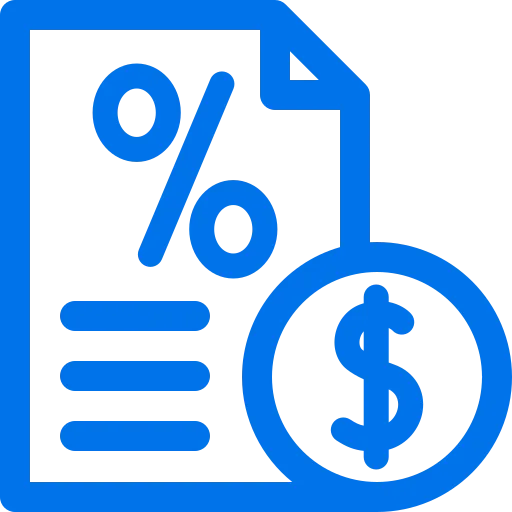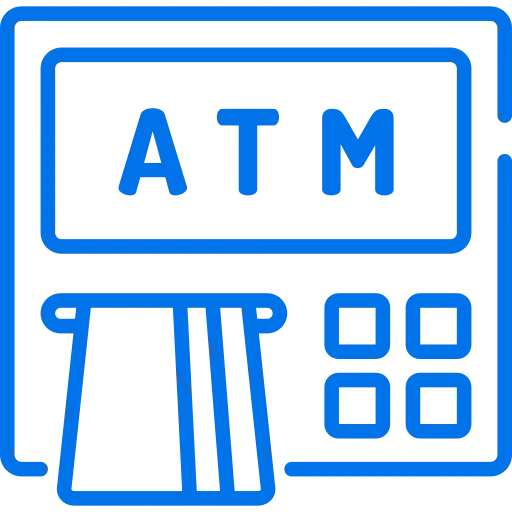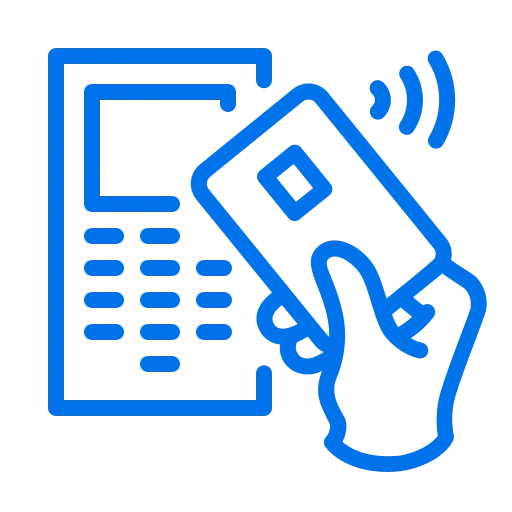What is a debit card?
When you open an Australian bank account, the bank will issue you a debit card to use as a way to access your money. You can use your debit card to get cash out at ATMs, make purchases in stores and online and manage your money via the linked mobile banking app or Internet banking. Usually the debit card will be either Visa or Mastercard, however this is just the branding and there are no real differences between the two.
How does a debit card work?
The debit card lets you use the money that's available in your bank account. You can use the card to pay for things in stores, cafes and supermarkets etc. by inserting the card into the EFTPOS machine and entering in your 4-digit PIN. Or, most debit cards these days come with contactless payment functionality meaning you can simply tap or hover your card over the EFTPOS terminal to make payments without entering your PIN.
When you've made a payment it will often display as 'pending' in your mobile banking app transaction history until it clears with the merchant (this can happen instantly or within a couple of days). If you don't have enough money in your 'available funds' you won't be able to make payments with your card, it'll be declined on the spot.
What can you use your debit card for?
You can use a debit card for pretty much everything these days. This is not an exhaustive list, but here are some common examples.
- Paying for your groceries at the supermarket
- Paying for petrol
- Buying clothes from a retail shop
- Buying breakfast at a cafe
- Getting cash out from an ATM
- Paying for a doctor's appointment over the phone
- Buying items online
- Paying for a doctors visit
- Getting cash out from an ATM overseas
- Making purchases overseas
- Buying airfare tickets online
- Booking hotels online
What's the difference between a debit card and a credit card?
A debit card is linked to your transaction account, so the money available to spend using your debit card is only what you have in your bank account. A credit card is borrowed money from the bank, which you need to pay back in full each month or you'll be charged interest on the money. With a debit card, you aren't charged interest on the money because it's not borrowed money - it's your money.
How to compare debit cards
At Finder, we've been comparing debit cards for more than a decade. Here's what to consider when choosing your own card.

Account fees
Check what fees the debit card charges and choose one with fewer fees if possible. Common fees include monthly account keeping fees, ATM fees and overdraft fees (this is where you let your account go into negative balance).

Overseas fees
If you're planning to use the debit card overseas it's a good idea to choose one with no international transaction fees and, if available, no overseas ATM fees.

Visa or Mastercard
Choosing either a Visa or Mastercard debit card will increase the flexibility and benefits, as these two card suppliers are supported all around the world. The high majority of debit cards will be by one of these providers.

ATM network
If you withdraw cash a lot look for a debit card that has no local ATM fees, or has free access to a large number of ATMs via its ATM network.

Contactless technology
Most new debit cards today enable you to make tap-and-go purchases without having to swipe your card or enter a pin. The feature lets you pay for items, usually costing $100 or less, by holding your card to a reader.

Special offers
Some bank accounts have special offers like a cash bonus when you open an account, a cashback offer when you shop or the ability to earn points and discounts.

Mobile app
Check the bank account comes with a mobile banking app so you can check your account easily anywhere at anytime via your phone.
Different types of debit cards
Most debit cards are fairly similar, however some do have particular features that make them better suited to different people.
- Student debit cards: Student bank accounts charge no account keeping fees and can offer features such as cashback perks and budgeting tools.
- Kids debit cards:Kids debit cards are offered by some banks as an optional extra when establishing a kids, youth or teen transaction account.
- Business debit cards: A business bank account and linked debit card can help you manage your day-to-day spending and cashflow.
- Travel debit cards: A great travel debit card will charge no international transaction fees and no overseas ATM fees.
- Reward debit cards: Some debit cards allow you to can earn various rewards including points, cashback offers and waived fees.
- Prepaid cards: Prepaid cards are usually used for travel, as it allows you to pre-load the currency you need onto the card. These cards only allow you to spend what's on the card, however, they're unlike regular debit cards because they're not attached to a bank account and therefore don't have the same level of protections.
Pros and cons of a debit card
Pros
- Easy access to your money. A debit cards lets you easily and instantly access your own money to make day-to-day purchases or withdraw cash at ATMs.
- No repayments. Because you can only spend what's in your account, you don't need to worry about meeting any repayments or being charged interest.
- Worldwide use. You can use your debit card in Australia and all over the world, making it easy to purchase things while travelling.
- Online purchases. You can use your debit card for online purchases as well as purchases over the phone.
Cons
- Only use what's in your account. If your balance is too low to make a purchase, you won't be able to use your debit card until you add more money into your account.
- Fees. Debit cards do come with various fees and charges, although you can avoid a lot of these when selecting your account.
- No frequent flyer points. Unlike many credit cards, debit cards don't offer the ability to earn frequent flyer or reward points.
How safe is a debit card?
Debit cards are very safe, and here are a few reasons why:
- You can't overspend: You can only spend what's available in your bank account, so you can't put yourself into debt with a negative balance.
- PIN protected. You need a 4-digit PIN to make purchases with your card (unless using tap-and-go) which only you should know. You can change your PIN at any time if you feel it's been compromised.
- Government guarantee: Your deposit up to $250,000 in an Australian bank account is protected under the Australian government's bank guarantee scheme, so if something were to happen to the bank your money would be safe.
- Freeze your card: If you've misplaced your debit card you can temporarily freeze or lock it (usually via the mobile app) so it can't be used for any purchases until you've found it.
- Bank's monitor for fraud: The banks have fraud protection systems in place to constantly monitor customer accounts for any suspicious activity or unusual transactions.
One of the biggest risks with a debit card is sharing your PIN or losing your card and not locking it in time. According to Moneysmart, if someone makes unauthorised transactions on your card you're less likely to have the bank reimburse you if you didn't keep your PIN secret, accidentally left your card in an ATM or delayed telling your bank that your card was lost or stolen.
How to apply for a debit card
It's easy and quick to apply for a debit card - all you need to do is complete the online application form on the bank's site. As debit cards come attached to an everyday transaction account, when you complete the application you'll be opening a new transaction account which will come with your debit card.
You'll need to meet some basic eligibility criteria to get a debit card in Australia.
Frequently asked questions
Why you can trust Finder's banking experts
 You pay nothing. Finder is free to use. And you pay the same as going direct. No markups, no hidden fees. Guaranteed.
You pay nothing. Finder is free to use. And you pay the same as going direct. No markups, no hidden fees. Guaranteed.
 You save time. We spend 100s of hours researching bank accounts so you can sort the gold from the junk faster.
You save time. We spend 100s of hours researching bank accounts so you can sort the gold from the junk faster. You compare more. Our comparison tools bring you more banking products from across the market.
You compare more. Our comparison tools bring you more banking products from across the market.
More guides on Finder
-
Save $624 by switching to a better home loan | Dollar Saver tip #93
Save $624 a month by switching home loans
-
Dollar Saver tips index
Find all the weekly tips from our Dollar Saver newsletter and see how you could save.
-
Finder’s RBA Survey: Experts predict a surge in arrears, unemployment as cash rate holds
Mortgage holders are bearing too much of the brunt of the RBA’s effort to bring down inflation, according to the majority of panellists in Finder’s latest poll.
-
Homeowners survive RBA cash rate decision, but is it enough?
With 41% of mortgage-holders struggling to pay their mortgages, is this month's cash rate hold enough to help?
-
see-u health insurance review
see-u is part of popular non profit insurer HBF - but if you’re interested in a policy, you’ll have to call. You can’t join online.
-
Revolut Business Transfers review
Check out Finder's review of Revolut Business Transfers and see if it's the right international business money transfer solution for you.
-
Basket bandits: 3.3 million Aussies have stolen a basket or trolley from the supermarket
A surprising number of Aussie shoppers have gone rogue with supermarket baskets or trolleys in the past year, according to new research by Finder.
-
Switch Week: 6 ripper ways to save cash with Kogan Essentials
SPONSORED: One week only! Score a range of great deals on financial products and services with Kogan.
-
August’s best balance transfer credit cards: get 0% for up to 28 months
We've crunched the numbers: Here are the 5 best balance transfer credit cards on the market right now.
-
August’s best frequent flyer credit cards: want 100,000+ bonus points?
Here are the top Qantas and Velocity Points earning card offers you can get right now.
Ask a question


Can I use visa debit to transfer English pounds to a nominated account in the U.K.?
Hi Raymond,
You can send money to a UK account using an Australian bank account, however it’ll need to be converted into GBP in the process unless you have a multi currency account that holds GBP.
Thanks,
Alison
I have put an incorrect figure into my debit card number. How do I correct it
Thank you
Hi Margaret,
Is this in reference to an application? You can resubmit your details or reach out to the provider directly to advise them of the needed correction.
Thanks,
Alison
My partner and I each have two private accounts, one with a debit card facility, and we share a joint account which also has a debit card facility. We are looking for a provider that will allow us to open five more joint accounts with debit card facilities for each. At the moment, our provider only allows a single joint account with a debit facility. Do you know of a provider where we can have more than one joint account with debit cards?
Kind Regards,
Brian
Hi Brian,
Thank you for getting in touch with Finder.
You may refer to our list of joint bank accounts. These accounts are all able to be opened in more than one name. You can use our comparison table to help you find the account that suits you. It is still best for you to contact your preferred bank to check if you can open up to 5 joint accounts with a debit card facility. When you are ready, please click on the ‘Go to site’ button to proceed with your online application. Please make sure that you’ve read the relevant T&Cs or PDS of this account to help consider whether the product is right for you.
I hope this helps.
Thank you and have a wonderful day!
Cheers,
Jeni
Do any debit cards offer membership to rewards programs?
Hi Rowan,
Thank you for reaching out.
Yes, there are bank accounts and debit cards that offer a rewards program depending on the type of rewards you feel will be beneficial for you. There are rewards such as points to dollar ratio, bonus points, cashback offers, and prizes.
You can head to our list of rewards debit cards to compare your options. Please use our comparison table to help you find the card that suits you. When you are ready, press the ‘Go to site’ button to apply.
Before applying, please ensure that you meet all the eligibility criteria and read through the details of the needed requirements as well as the relevant Product Disclosure Statements/Terms and Conditions when comparing your options before making a decision on whether it is right for you. You can also contact the provider if you have specific questions.
Hope this helps! 😊
Kind Regards,
Mai
do you offer the cards for people out AU?
Hi Ahmed,
Thanks for leaving a question on finder.
finder caters to users who live in Australia, Canada, New Zealand, UK and USA. If you are not from these countries, unfortunately, you will have to check with your local banks to see what offers they have available for you.
Cheers,
Joel